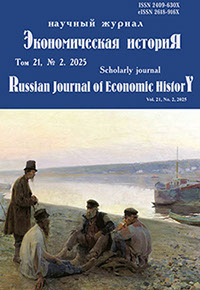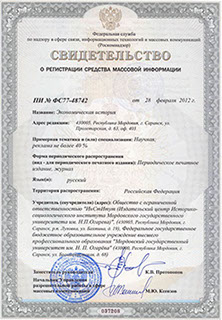Экономическая историЯ
Russian Journal of Economic History
ISSN 2409-630X (Print)
ISSN 2618-916X (Online)
Expert board:
- Scientific Council of RAS on economic history;
- Research and Educational Center «The economic history of Central Russia and the Middle Volga region» of Ogarev Mordovia State University;
- Center of Economic History of Lomonosov Moscow State University
Navigation
Sergey N. Andreenkov
Institute of history SB RAS (Novosibirsk, Russia),
e-mail: andreenkov_sn@mail.ru
Changes in the Procedure for Determining the Minimum Workdays in Collective Farms and Labour Behaviour of Collective Farmers (mid-1950s)
Abstract
Introduction. At present, the study of the agrarian policy of post-Stalin’s ‘collective leadership’ is one of the most actual areas of the study of agrarian history of the USSR. The analysis of government decisions designed to expand the self-government of collective farms is becoming more and more relevant. The focus of our attention is on the goals, progress and results of the implementation of the resolution adopted on 23 June 1954 by the Council of Ministers of the USSR under the chairmanship of G. M. Malenkov ‘On the compulsory minimum of workdays for able-bodied collective farmers’, which gave collective farms the opportunity to determine discretion the workload for working members of the agricultural collective.
Materials and Methods. The study is of a concrete-historical character. The sources of reference for it are the above-mentioned decree, as well as two reports on its implementation, found in the fonds of the Ministry of Agriculture of the USSR No. 7486 of the Russian State Archive of Economics. The information contained in these documents makes it possible to correct the established ideas about the analysed processes and reveal their hidden trends.
Results. The implementation of the decree of 23 June 1954 was not without serious violations of the provisions of the document, in particular, in the establishment of underestimated workloads. Most of the excesses were connected with the approval of minimum workloads for men and women separately: there was a desire to free women from labour in collective farms so that they could devote more attention to the household, as well as an intention to minimise the workload for men from the end of autumn to the beginning of summer.
Discussion and Сonclusion. The government’s measures to develop self-governance of collective farms, the most important of which was the adoption of the decree under consideration, were not appreciated by collective farmers, and the great labour enthusiasm predicted by the authorities was not generally shown. On the contrary, the peasants perceived the reduction of administrative pressure on farms as a chance to reduce their labour load. Collective farmers had an opportunity to redistribute the time and effort spent on labour in the public sector of collective farm production in favour of individual farming, which did not contradict the policy of supporting private subsidiary farms that was being pursued at the same time. The government’s decision to stimulate private subsidiary farms, taken in order to prevent an acute food crisis, did not generally contribute to the development of collective and state farms.
Keywords: compulsory minimum of labour days, government decree of 23 June 1954,
G. M. Malenkov’s government, collective farms, collective farmers, labour behaviour, personal subsidiary farming.
For citation: Andreenkov S. N. Changes in the Procedure for Determining the Minimum Workdays in Collective Farms and Labour Behaviour of Collective Farmers (mid-1950s). Ekonomicheskaya istoriya = Russian Journal of Economic History. 2025; 21(2): 124–136. (In Russ.). DOI: 10.24412/2409-630X.069.021.202502.124-136.
Acknowledgements: The article is based on the state assignment “Socio-economic potential of the Eastern regions of Russia in the twentieth and early Twenty–first centuries: management strategies and practices, dynamics, and the geopolitical context” (FWZM-2024-0005).
© Ogarev Mordovia State University. History and Sociology Institute, 2017
68, Of. 411, Bolshevistskaya St., 430005, The editorial office of the scholarly journal «Russian Journal of Economic History»
Tel.: (8342) 24-25-90; 27-07-11, Fax: (8342) 24-25-90, E-mail: jurnal-econom-hist@isi.mrsu.ru
Designed by A. Napalkov, Email: napalkov@isi.mrsu.ru


